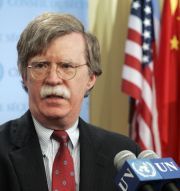UN moves closer to takeover of Sudan’s Darfur peacekeeping
Feb 3, 2006 (UNITED NATIONS) — The Security Council authorized the United Nations on Friday to start planning for a U.N. takeover of peacekeeping duties in Sudan’s conflict-wracked Darfur region from the African Union.
 A council statement asked Secretary-General Kofi Annan “to initiate contingency planning without delay” with the AU on options for a possible transition to a U.N. operation. It said Annan and the AU should cooperate with Sudan’s national unity government, the Security Council and key countries trying to promote peace in Darfur in the planning process.
A council statement asked Secretary-General Kofi Annan “to initiate contingency planning without delay” with the AU on options for a possible transition to a U.N. operation. It said Annan and the AU should cooperate with Sudan’s national unity government, the Security Council and key countries trying to promote peace in Darfur in the planning process.
“The purpose of today’s presidential statement was to kick off contingency planning,” said U.S. Ambassador John Bolton, the current council president. “And my instructions, and my intentions are very clear _ which is to move as far and as fast as we can during the month of February.”
The African Union has agreed in principle to transform its 7,000-strong peacekeeping force in Darfur into a U.N. peacekeeping force, a move supported by many council members including the United States.
If the U.N. doesn’t take over, said Greece’s U.N. Ambassador Adamantios Vassilakis, “it means we don’t want peace in the area.”
The council statement, which was approved unanimously, will enable the U.N. Secretariat to ask governments whether they might participate in a U.N. operation in Darfur, Bolton said.
Decades of low-level tribal clashes over land and water in the vast western Darfur region erupted into large-scale violence in early 2003 when ethnic African tribes took up arms, accusing the Arab-dominated central government of neglect.
The government is accused of unleashing Arab tribal militias to murder and rape civilians and lay waste to villages, but it denies the charge. An estimated 180,000 people have died in the upheaval — many from hunger and disease.
In Washington, Jendayi Frazer, who leads the State Department’s Africa bureau, sidestepped questions about whether the Sudanese government is still committing genocide in Darfur, but reiterated that “the United States has said that a genocide has occurred in Sudan.”
The Security Council statement reiterated “in the strongest terms the need for all parties in Darfur to end the violence and atrocities” and stressed the importance of urgently concluding peace talks in Abuja, Nigeria.
Bolton said it was premature to speculate on whether the United States or the European Union would contribute troops to a U.N. force in Darfur. He said U.S. planners will work very closely with U.N. planners to evaluate what’s needed in Darfur, building on the AU’s operation.
“It’s a complicated and operationally logistically difficult mission,” he said.
France’s U.N. Ambassador Jean-Marc de La Sabliere said the council will closely monitor the U.N. planning.
In Washington, Kirsten Silverberg, who heads the State Department office responsible for U.N. matters, told reporters the United States envisions combining the AU force in Darfur with the 7,000 U.N. troops monitoring a separate peace agreement between southern rebels and the Sudanese government. She declined to predict the number of troops in the combined U.N. mission.
Silverberg said the United States anticipates a robust U.N. mandate that charges the new U.N. mission with monitoring cease-fire agreements, protecting civilians, and protecting humanitarian deliveries. She said other duties will include monitoring compliance with a Security Council arms embargo and military flight ban as well as human rights violations.
The Security Council said it looks forward to an early decision from the African Union Peace and Security Council on the AU force. It said contingency planning should make maximum use of the AU force and the U.N. mission in southern Sudan.
Last month, the AU council extended the AU force’s mandate until March 31, authorized consultations with the U.N., and said a final decision would be taken by ministers at the end of March.
The AU force has made a significant difference where its troops have been deployed. But it has been hampered by a shortage of funds, troops, and equipment and its mandate has been limited to monitoring an April 2004 cease-fire that is regularly broken by all parties and offering limited protection to civilians.
In early January, the top U.N. envoy in Sudan, Jan Pronk, said efforts to bring peace to Darfur had failed and called for a U.N. peacekeeping force of up to 20,000 troops to disarm marauding militias and provide security so over 2 million refugees can return home.
Pronk told a German newspaper in late January he expects the United Nations to deploy a peacekeeping force in Darfur by early 2007 and said it would need a mandate of four years to disarm parties to the conflict. He also said he foresees sanctions for offenses against U.N. resolutions.
(AP/ST)
